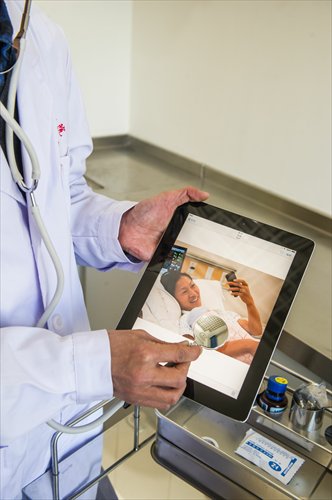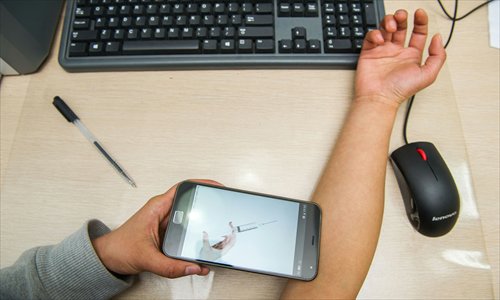Online doctors
How the Internet makes it easier for people to access medical care in China

Medical professionals can give advice online for a range of scenarios, including prenatal checks and ultrasound scans. Photo: Li Hao/GT
Rather than just resting his weary bones after a long day attending to patients, Yu Keyi, an orthopedist at Peking Union Medical College Hospital, spends most of his evenings in front of a computer, giving online consultations to people who would otherwise not have access to his expertise.
"On average, I give medical advice to three to five people each day," said Yu, who gives online consultations through several platforms including Sina Weibo, WeChat and haodf.com, a website registry set up specifically for facilitating online and telephone consultations between medical professionals and those seeking medical advice.
The initiatives, said Yu, help address the problem of access to good medical care in China, particularly in less developed towns and rural areas. At present, the best doctors and medical facilities are concentrated in China's largest cities.
According to a Guangzhou Daily report last May, there are 196 "first class" hospitals in Beijing, Shanghai and Guangzhou in Guangdong Province, compared to only 37 in Xinjiang Uyghur Autonomous Region, Qinghai Province, Ningxia Hui Autonomous Region and Tibet Autonomous Region combined.
Consequently, hospitals in China's biggest cities are often overwhelmed with patients from all over the country.
Many of the top hospitals routinely receive twice the number of patients per day than they are equipped to handle, according to a Bohai Morning Post report last August.
"The borderless nature of the Internet enables patients from small towns or even rural villages to have access to expert advice through online consulting, without traveling for thousands of miles," said Yu.
Prioritizing preventative care
Yu is quick to point out that online consultations are not a substitute for face-to-face diagnosis. Under Chinese law, it is illegal for doctors to make a full diagnosis or prescribe treatment without seeing the patient face-to-face.
Rather, Yu suggested, the primary benefit of online platforms connecting doctors and patients was to shift the paradigm of healthcare to emphasize preventative care and general well-being over merely treating a patient after he or she is already sick.
Unlike in the UK and the US, where there are family health clinics, doctors in China's hospitals rarely have any acquaintance with their patients' medical histories beyond the immediate ailment they are treating.
"Doctors can administer better care if they know and understand their patients, and are able to develop a relationship with their patients," said Yu, who said that online consultations allowed doctors to establish such relationships.
"[This way], doctors can provide ongoing and preventative care for patients."
Although doctors cannot prescribe treatment over the Internet, said Yu, online consultations offered patients access to medical advice that would otherwise be much more difficult to get.
According to a February article on lifetimes.cn, around 80 percent of the consultations on haodf.com are between doctors and patients in different cities.
Doctors online could also advise patients from small towns whether they need to crowd into a large hospital in a big city for treatment, or whether their health problem could likely be treated equally well at a smaller hospital, where there are less people, said Yu.

Online consultations offer people in China's less developed areas to get medical opinions from respected specialists anywhere in the country. Photo: Li Hao /GT
Access to specialist advice
Another benefit of online consultations, as 29-year-old Li Zhilin discovered, is that it can give people access to specialist second opinions.
Last July, Li, who lives in Hangzhou, Zhejiang Province, contacted Zhuang Shaowei, a cardiologist at Dongfang Hospital Affiliated to Tongji University in Shanghai, through Sina Weibo to ask for his advice about his mother's health condition.
Over the Internet, Li sent Zhuang a CT scan made at his mother's local hospital in Jingdezhen, Jiangxi Province.
He told Zhuang that his mother had been complaining of chest pain for years, and that the pain had gotten worse and become more frequent recently. Doctors at her local hospital had not found anything wrong.
"Based on the symptoms Li described and the CT scans he sent me, my opinion was that his mother was suffering from severe angina, and that there was a high risk that she could have a fatal heart attack," said Zhuang.
On Zhuang's advice, Li took his mother to a hospital in Nanchang, the capital of Jiangxi Province. His mother had previously refused to travel to Nanchang for treatment because of the potential cost, but after hearing Zhuang's opinion, she acquiesced.
After several months of treatment, Li's mother is now in a stable condition.
"I don't want to imagine what might have happened if we waited any longer," said Li.
Li said that he and Zhuang are still in regular contact about his mother's condition, with Zhuang giving advice whenever there is a change in her condition.
"[Currently], doctors can only give advice online. If I live in a small county and I want a formal diagnosis or to receive treatment in a good hospital in another city, I still have to travel there in person," said Li.
"I hope that in the future, there will be technology that enables doctors to treat major diseases or even perform surgery remotely."
Making medical care easier
Gong Xiaoming, a gynecologist at Amcare Women's and Children's Hospital in Beijing and founder of online consultation platform china-obgyn.net, said that the goal of such platforms was to make access to medical care easier and more efficient.
"Take my work for example. If a patient needs advice about an ultrasound scan or they have any questions between prenatal checkups, it's far easier for patients to do it online, rather than having them go to the trouble of going to a hospital," Gong explained.
He said that china-obgyn.net, and its mobile app he has developed, Fengxinzi, currently has more than 100,000 doctors registered.
The app has been downloaded more than 16,000 times.
Noting the demand for such services, Chinese Internet giants Tencent, Alibaba and Baidu are also getting in on the act. All three companies laid out wide-ranging plans for how they intended to use the Internet to improve healthcare in China at the ongoing two sessions in Beijing.
Metropolitan spoke to representatives of two of the companies.
A spokesperson from Tencent said that it was now possible to register for appointments at 1,200 hospitals around the country through their social media platform WeChat.
Some hospitals also allow users to make payment and receive CT scans through the social media platform.
In addition, Tencent has invested $70 million in Dingxiangyuan, a social networking platform for medical professionals to share specialized knowledge.
Future plans include the implementation of an online database with people's medical histories and propensity to certain diseases based on their lifestyle habits.
This will expand the scope of online consultation on WeChat by improving preventative care for patients, according to the spokesperson.
Alibaba's spokesperson said that it had set up a cloud platform whereby patients' medical histories could be shared between more than 40,000 medical institutions around the country, to help improve accuracy and efficiency of diagnoses.
Patient's prescription information will also be shared on the cloud platform, along with hospital's pharmaceutical inventory, so doctors will be able to advise patients where they need to go to acquire appropriate medicines.
In addition, Alibaba has launched an app called Ali Health for online consultations.
The app allows people to register at hospitals, pay, and to determine the authenticity of medicines they have bought by scanning an electronic product code.
Baidu did not respond to a request for comment by the time of going to press, but in a People's Daily report on March 3, CEO Robin Li pledged to continue developing their online consultation platform, and urging more hospitals to allow online registration.